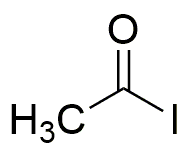Acetyl iodide is widely utilized in research focused on:
- Synthetic Chemistry: It serves as a versatile reagent for the introduction of acetyl groups in organic synthesis, enabling the formation of various acetylated compounds that are essential in pharmaceuticals and agrochemicals.
- Medicinal Chemistry: Researchers use acetyl iodide to modify drug molecules, enhancing their efficacy and bioavailability. This modification can lead to improved therapeutic profiles for existing medications.
- Material Science: In the development of polymers and advanced materials, acetyl iodide is employed to create functionalized surfaces, which can enhance properties such as adhesion and chemical resistance.
- Biochemistry: It is utilized in the synthesis of acetylated biomolecules, which are crucial for studying enzyme activity and metabolic pathways, providing insights into biological processes.
- Analytical Chemistry: Acetyl iodide is used in derivatization techniques to improve the detectability of certain compounds in chromatography, facilitating the analysis of complex mixtures in environmental and food safety testing.
General Information
Properties
Safety and Regulations
Applications
Acetyl iodide is widely utilized in research focused on:
- Synthetic Chemistry: It serves as a versatile reagent for the introduction of acetyl groups in organic synthesis, enabling the formation of various acetylated compounds that are essential in pharmaceuticals and agrochemicals.
- Medicinal Chemistry: Researchers use acetyl iodide to modify drug molecules, enhancing their efficacy and bioavailability. This modification can lead to improved therapeutic profiles for existing medications.
- Material Science: In the development of polymers and advanced materials, acetyl iodide is employed to create functionalized surfaces, which can enhance properties such as adhesion and chemical resistance.
- Biochemistry: It is utilized in the synthesis of acetylated biomolecules, which are crucial for studying enzyme activity and metabolic pathways, providing insights into biological processes.
- Analytical Chemistry: Acetyl iodide is used in derivatization techniques to improve the detectability of certain compounds in chromatography, facilitating the analysis of complex mixtures in environmental and food safety testing.
Documents
Safety Data Sheets (SDS)
The SDS provides comprehensive safety information on handling, storage, and disposal of the product.
Product Specification (PS)
The PS provides a comprehensive breakdown of the product’s properties, including chemical composition, physical state, purity, and storage requirements. It also details acceptable quality ranges and the product's intended applications.
Certificates of Analysis (COA)
Search for Certificates of Analysis (COA) by entering the products Lot Number. Lot and Batch Numbers can be found on a product’s label following the words ‘Lot’ or ‘Batch’.
*Catalog Number
*Lot Number
Certificates Of Origin (COO)
This COO confirms the country where the product was manufactured, and also details the materials and components used in it and whether it is derived from natural, synthetic, or other specific sources. This certificate may be required for customs, trade, and regulatory compliance.
*Catalog Number
*Lot Number
Safety Data Sheets (SDS)
The SDS provides comprehensive safety information on handling, storage, and disposal of the product.
DownloadProduct Specification (PS)
The PS provides a comprehensive breakdown of the product’s properties, including chemical composition, physical state, purity, and storage requirements. It also details acceptable quality ranges and the product's intended applications.
DownloadCertificates of Analysis (COA)
Search for Certificates of Analysis (COA) by entering the products Lot Number. Lot and Batch Numbers can be found on a product’s label following the words ‘Lot’ or ‘Batch’.
*Catalog Number
*Lot Number
Certificates Of Origin (COO)
This COO confirms the country where the product was manufactured, and also details the materials and components used in it and whether it is derived from natural, synthetic, or other specific sources. This certificate may be required for customs, trade, and regulatory compliance.


